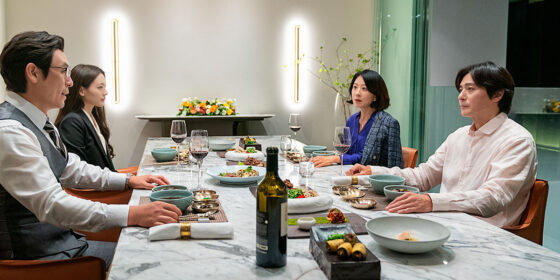TIFF 2023 | A Normal Family (Hur Jin-ho, South Korea) — Gala Presentations

By Michael Sicinski
Hur Jin-ho made his reputation on a handful of romantic dramas that were distinguished by their light touch and quiet rigour. It would be easy to complain about how leaden and overdetermined A Normal Family is in comparison to Christmas in August (1998) or One Fine Spring Day (2001), but let’s be honest. When’s the last time any of us even thought about those films? By contrast, A Normal Family is the sort of upper-middlebrow entry guaranteed to garner attention, and probably destined for an English-language remake. Someone like Jim Sheridan or Sam Mendes could knock this off in his sleep, and we would find it in the lower reaches of Oscar prognosticator lists until it dropped off the map altogether.
Irony alert: you may be surprised to learn that the clan at the centre of A Normal Family are not normal at all. There are two brothers, you see. Jae-gyu (Jang Dong-gun) is an upstanding paediatrician. Jae-wan (Sul Kyung-gu) is a high-power lawyer with dubious morals. When their respective kids meet up one night and indulge in a bit of the old ultraviolence, the family is forced to make some difficult choices. Will the doctor and his wife, both Peace Corps liberals, turn out to have a mercenary streak? Will the unscrupulous lawyer and his young, attractive second wife ironically end up as beacons of moral virtue? As Mark E. Smith put it, have a bleedin’ guess. The film is punctuated by three deeply uncomfortable family dinners, and Hur coaxes suitable slow-burns from a solid cast. Sadly, everything in between is bluster and nonsense, betraying a not-so-sublte conservatism. Kids today, with their smartphones and YouTube and beer pong! What is the world coming to?
To be fair, A Normal Family is never less than diverting. Hur’s sure-footed direction, and crisp, well-appointed cinematography by Go Rak-sun go a long way to put the material over, but there’s no avoiding just how self-satisfied that material is. This is an adaptation of Herman Koch’s novel The Dinner, and the script is certainly “literary,” in the sense that human behaviour or basic common sense are sacrificed in favour of clever reversals of fortune, 180-degree personality shifts, and a thematic rhyme between the beginning and the end. The Dinner is the graduate MFA workshop model of good writing, offering the impression that plot details have all been graphed, down to the nearest degree and minute. That the film is even slightly more believable is all to Hur’s credit, which just makes me want to go back and watch April Snow (2005) again.
Michael Sicinski- « Previous
- 1
- 2


